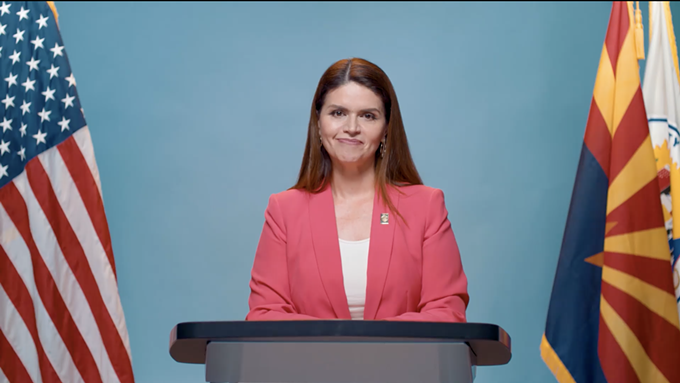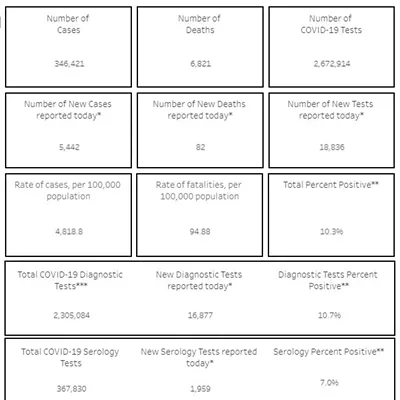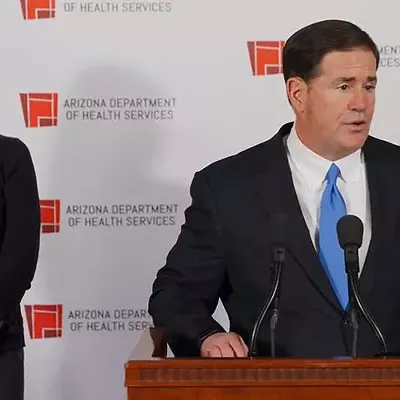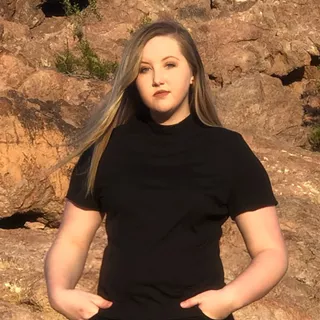Thursday, December 3, 2020
Tucson Mayor Delivers Message of Hope at State of the City Address
Tucson Mayor Regina Romero delivered a State of the City address last night providing a message of hope in the face of an unprecedented pandemic while discussing key issues such as climate change, public safety and housing.
After she was sworn into the mayor’s office in December 2019, one of Romero’s first priorities was to create quality core services and work Tucsonan’s needs into the city’s budget.
Then, the coronavirus pandemic hit.
“With priorities set and goals in hand, we began to take action. Shortly after, our city, our state, and our nation was confronted with the worst health crisis our world has seen in recent history,” Romero said. “Despite the challenges that COVID-19 has presented, we banded together as one city, one community, and made immeasurable sacrifices to protect the health of our loved ones and fellow Tucsonans.”
As of Tuesday, Pima County has reported 695 coronavirus deaths and 40,803 cases.
“Each and every one of those lives is much more than just a statistic,” the mayor said. “They were parents, grandparents, sons and daughters, aunts and uncles, friends and neighbors. They were our fellow Tucsonans. The best way we can honor their memory is through maintaining our resolve by continuing to follow public health guidelines.”
Romero said despite a lack of guidance, Tucson was “several steps ahead” of the state and federal government, saving millions in its budget for COVID-19 testing.
But as coronavirus cases reach levels higher than Arizona saw in its summer surge in cases, the mayor pushed a message of hope.
“All of us have sacrificed so much to protect the health of our most vulnerable Tucsonans...Although it is difficult to see, the collective sacrifices of all of us have saved lives,” she said. “I understand how exhausted and fatigued you are with this pandemic, I am too, but we need to stay the course. Brighter days are ahead, there is light at the end of the tunnel.”
Romero lauds Tucson’s economic relief measures during the pandemic
Romero acknowledged the devastating toll the virus has taken on the economy but said the city council’s allocation of $55 million in relief funds through the federal CARES Act money has ensured “those with the greatest need received timely help.”
According to Romero, Tucson’s “We Are One, Somos Uno Resiliency Fund” has given millions to businesses, nonprofits and essential workers in need.
A total of $7 million was provided to small businesses through the YWCA of Southern Arizona to help them make rent and utility payments while focusing on “minority, women, disabled, and veteran-owned businesses,” Romero said.
Romero praised the mayor and council’s partnership with the Community Foundation for Southern Arizona to give more than $1 million in grants to Tucson’s nonprofit organizations, as well as a partnership with The Women’s Foundation to provide $5 million in cash assistance for 5,000 families and individuals.
The Southern Arizona Arts Foundation received $1 million from the city to fund local artists, entertainment venues, and arts organizations, according to Romero.
In addition to providing funds for those struggling through the pandemic, Romero enacted moratoriums on water shut-offs and evictions at city-owned housing.
“Our recovery is complex and multifaceted, and we need to continue to work collaboratively with federal, state and local governments to provide relief to Tucsonans,” she said. “This will require Congress to pass an additional relief package as soon as possible.”
Tucson makes progress throughout the pandemic
Although she waits for Congress to pass another federal relief package, Romero said the city has utilized its available resources to improve Tucson, including paving 670 miles of road in the city’s main corridors and more than 225 miles in neighborhoods.
“We will continue to address the needs of our community, making every single dollar count and taking advantage of strong community partnerships to maximize our resources,” she said. “Tucson is resilient and we will come out of this stronger.”
Romero said the city is also investing in six new mobile recreation centers using CARES Act funding for children to play outdoors safely.
How Romero will address climate change at a local level
With a summer filled with wildfires and many days over 100 degrees, Romero plans to take steps to locally address climate change this year.
The mayor exalted the city council’s unanimous vote to approve Tucson’s Climate Emergency Declaration, which set a goal for Tucson’s operations to reach carbon neutrality by 2030. Romero said the mayor and council also allocated funds to create a Climate Action and Adaptation plan.
Tucson’s mayor is also making plans to make the city’s transit fleet electric and has added five new electric SunTran buses. In the spring, Romero said the city launched an initiative to plant one million trees by 2030.
The mayor discussed Tucson’s water security and said the city’s making investments to expand and renew its water infrastructure.
“We have strong water security that will allow us to continue to grow sustainably into the future,” Romero said. “Not only does Tucson hold a 100-year water supply designation from the State of Arizona, we have stored almost 50 years of water in our local aquifers that we can rely on in times of need.”
Maintaining public safety through reform efforts
Romero said Tucson is making big strides in the public safety sector and has purchased more than 1,000 laptops, 300 body cameras and 700 ballistic vests.
Given the focus on the Black Lives Matter movement and police reform this year, Romero said the council has agreed to create a Community Safety Pilot Program that will “look holistically at how we provide safety to our community.”
This week’s updates, tentative budget, Community Safety Pilot Program, CDC recommendations, and more!
— Regina Romero (@TucsonRomero) July 3, 2020
Tucson City Council Passes Tentative Budget: https://t.co/35llCITFUI
How Would You Prioritize the City's Budget?: https://t.co/BXV0pzE0j7 pic.twitter.com/Z3znmG5kHu
The program will work with outside agencies that specialize in mental health and provide funding for six new social workers.
“This year, our city and our nation have been confronted with difficult but necessary conversations about policing, equity, and justice,” Romero said. “I believe what sets Tucson apart is that we have approached these conversations honestly, with a willingness to talk openly about issues of systemic racism and cultural bias. While we still have much work to do, we have made positive strides to improve trust and reimagine the role of our police department in providing public safety.”
Romero addresses homelessness and housing initiatives
Romero discussed the city’s new initiative to hire a “Housing First Director,” which she says will help place those experiencing homelessness in Tucson into low-barrier shelters.
The mayor said the city’s Department of Housing and Community Development has housed 925 residents, and through CARES Act funding, 200 individuals were moved into permanent supportive housing.
Romero also expressed gratitude for the Commission on Equitable Housing & Development created by the mayor and council to keep housing affordable in Tucson.
“I look forward to speaking with stakeholders from across the spectrum – developers, neighbors, small businesses, and affordable housing advocates – to identify solutions to preserve and expand affordable housing options,” she said.
A hopeful future
Romero said within the first quarter of 2021, she’ll update Tucson’s Comprehensive Economic Development Strategy, a plan that helps the city qualify for federal grants.
Despite the economic turmoil brought on by the coronavirus pandemic, Romero says Tucson has fared well.
“Thanks to wise financial planning over the years by the city manager and his financial team, at the direction of mayor and council, the city is positioned to not just weather the storm, but return even stronger,” she said. “For the first time, we are in a position to set 10% of our general fund in our rainy day fund.”
Tucson’s mayor ended her state of the city address with a firm message of hope.
“The reason why I am so optimistic for what the future holds is Tucson’s spirit of coming together to solve problems,” Romero said. “At the end of the day, no matter what difference of opinion we may have, we all have one common goal: to create a safe and sustainable city with economic opportunity for all.”













